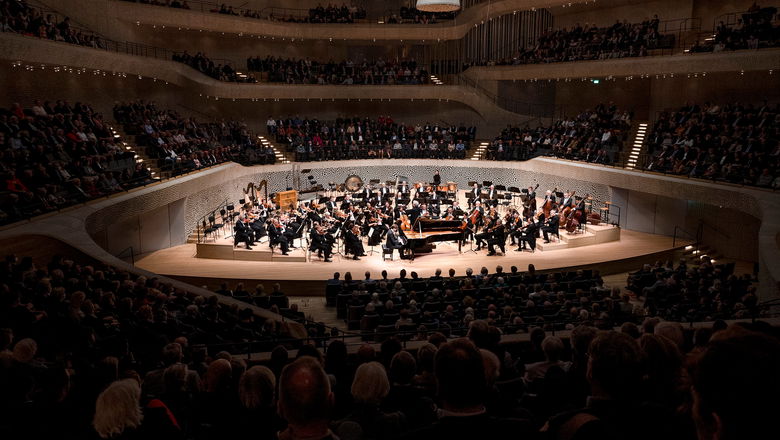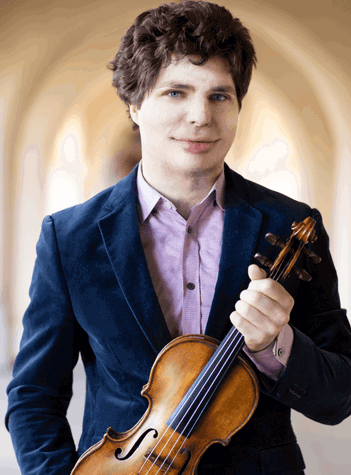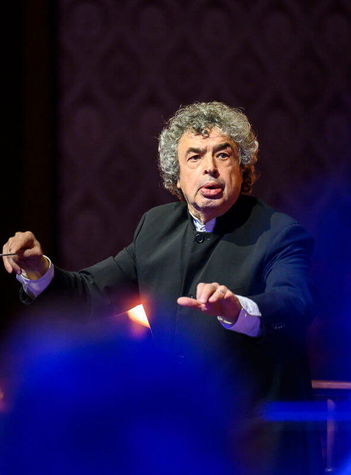Programme
Antonín Dvořák
In Nature’s Realm, concert overture, Op. 91
Antonín Dvořák
Violin Concerto in A minor, Op. 53
Antonín Dvořák
Symphony No. 8 in G major, Op. 88
Secure your seat for the 2025/2026 season – presales are open.
Choose SubscriptionReturns by the Czech Philharmonic to Hamburg’s famed concert hall have become a tradition in recent years. This time they are bringing an all-Dvořák programme for a two-day residency. On the first evening, Semyon Bychkov will conduct the concert overture In Nature’s Realm, the Violin Concerto with Augustin Hadelich, and the Eighth Symphony.
Antonín Dvořák
In Nature’s Realm, concert overture, Op. 91
Antonín Dvořák
Violin Concerto in A minor, Op. 53
Antonín Dvořák
Symphony No. 8 in G major, Op. 88
Augustin Hadelich violin
Semyon Bychkov conductor
Czech Philharmonic

Augustin Hadelich violin

The life of Augustin Hadelich is the story of a prodigy from a farm in Tuscany who has managed to rise to the very summit among today’s most important performers worldwide. He was born in the Italian town Cecina (not far from Livorno) to German parents who owned a farm there. He began playing the violin at age five (his two brothers were already playing cello and piano at home) under the guidance of his father, an amateur cellist, who long remained his only teacher apart from a couple of famous violinists (Norbert Brainin and Uto Ughi) who travelled to Tuscany to spend the summer and were also willing to give Augustin lessons. They recognised his great talent, so Hadelich began studies at the Istituto Mascagni, a conservatoire in nearby Livorno. Later, he was admitted to the prestigious Julliard School, where he studied under Joel Smirnoff.
He began his performing career at age 22, when he won the International Violin Competition of Indianapolis (2006). Since then, music critics have been showering him with superlatives for his phenomenal technique, stunning tone colour, and thoughtful interpretations. He finds subtle nuances in compositions, and he does not hesitate to experiment, as he showed in his solo Bach recording, for which he used a Baroque bow to achieve the ideal sound. He is also unafraid to perform contemporary music. In fact, his recording of Dutilleux’s Violin Concerto won a 2016 Grammy.
His concert and recording credits also include many works of the traditional repertoire, such as the Dvořák Violin Concerto on today’s programme, which can be heard on Hadelich’s CD “Bohemian Tales” with Jakub Hrůša and the Bavarian Radio Symphony Orchestra, for which Hadelich won the 2021 Opus Klassik prize and earned a Grammy nomination, which he did not win in this case, although critics praised his ability to tell a story through music, to present an interpretive statement with confidence, or to devote great attention to small details of articulation.
His career races ahead at a hectic pace so the pure sound of his violin, a 1744 Guarneri, will be heard in the world’s most important concert halls. His partners on his musical pilgrimages include America’s most important orchestras as well as the Berlin Philharmonic, the Concertgebouw Orchestra in Amsterdam, the London Philharmonic Orchestra, and the NHK Symphony Orchestra in Tokyo. Hadelich also teaches violin at Yale University and gives masterclasses.
Semyon Bychkov conductor

In addition to conducting at Prague’s Rudolfinum, Semyon Bychkov and the Czech Philharmonic in the 2023/2024 season, took the all Dvořák programmes to Korea and across Japan with three concerts at Tokyo’s famed Suntory Hall. In spring, an extensive European tour took the programmes to Spain, Austria, Germany, Belgium, and France and, at the end of year 2024, the Year of Czech Music culminated with three concerts at Carnegie Hall in New York.
Among the significant joint achievements of Semyon Bychkov and the Czech Philharmonic is the release of a 7-CD box set devoted to Tchaikovsky’s symphonic repertoire and a series of international residencies. In 2024, Semjon Byčkov with the Czech Philharmonic concentrated on recording Czech music – a CD was released with Bedřich Smetanaʼs My Homeland and Antonín Dvořákʼs last three symphonies and ouvertures.
Bychkovʼs repertoire spans four centuries. His highly anticipated performances are a unique combination of innate musicality and rigorous Russian pedagogy. In addition to guest engagements with the world’s major orchestras and opera houses, Bychkov holds honorary titles with the BBC Symphony Orchestra – with whom he appears annually at the BBC Proms – and the Royal Academy of Music, who awarded him an Honorary Doctorate in July 2022. Bychkov was named “Conductor of the Year” by the International Opera Awards in 2015 and, by Musical America in 2022.
Bychkov began recording in 1986 and released discs with the Berlin Philharmonic, Bavarian Radio, Royal Concertgebouw, Philharmonia Orchestra and London Philharmonic for Philips. Subsequently a series of benchmark recordings with WDR Symphony Orchestra Cologne featured Brahms, Mahler, Rachmaninov, Shostakovich, Strauss, Verdi, Glanert and Höller. Bychkov’s 1993 recording of Tchaikovsky’s Eugene Onegin with the Orchestre de Paris continues to win awards, most recently the Gramophone Collection 2021; Wagner’s Lohengrin was BBC Music Magazine’s Record of the Year (2010); and Schmidt’s Symphony No. 2 with the Vienna Philharmonic was BBC Music Magazine’s Record of the Month (2018).
Semyon Bychkov has one foot firmly in the culture of the East and the other in the West. Born in St Petersburg in 1952, he studied at the Leningrad Conservatory with the legendary Ilya Musin. Denied his prize of conducting the Leningrad Philharmonic, Bychkov emigrated to the United States in 1975 and, has lived in Europe since the mid-1980’s. In 1989, the same year he was named Music Director of the Orchestre de Paris, Bychkov returned to the former Soviet Union as the St Petersburg Philharmonic’s Principal Guest Conductor. He was appointed Chief Conductor of the WDR Symphony Orchestra (1997) and Chief Conductor of Dresden Semperoper (1998).
Antonín Dvořák
In Nature’s Realm, concert overture, Op. 91
Antonín Dvořák
Violin Concerto in A minor, Op. 53
The years 1878–1880 tend to be called Antonín Dvořák’s “Slavonic period” because it was especially at that time that he took Slavic folk music as his point of departure. It was also during those three years that he created such highly successful compositions as his Serenade for Winds, three Slavonic Rhapsodies, the Czech Suite, the Symphony No. 6, the first set of Slavonic Dances, Gypsy Melodies, and a number of piano compositions. In those days, a Slavonic “tone” was in demand in Czech-speaking territory for reasons of patriotism and in a European context to satisfy the desire for uniqueness and “exoticism”. One of Dvořák’s masterpieces, not limited to the context of his Slavonic period, is undoubtedly his Violin Concerto in A minor, Op. 53, written in Sychrov in the summer of 1879.
Naturally, the composer was pleased by the interest of Simrock’s Berlin publishing house in another work in a “Slavonic vein”. At the time, Dvořák was maturing as a composer, and he aspired to attempt virtuosity with inventive content. Like many of his contemporaries and predecessors beginning with Beethoven, Dvořák had a particular violin virtuoso in mind for the solo part, in his case Joseph Joachim, to whom he dedicated the concerto. In the spring of 1880, Dvořák even visited Joachim in Berlin and consulted on the work with him. The virtuoso violinist had reservations about certain passages that he regarded as being too difficult, and in his judgment the orchestration was too thick in places. That does not mean, however, that he did not express praise for the concerto. Dvořák made changes to the work at the suggestion of the violin virtuoso. He finished the last revisions in October 1882.
Afterwards, it became clear that Joseph Joachim would not give the concerto’s premiere, so Dvořák entrusted the first performance to the 26-year-old violin virtuoso František Ondříček. The premiere took place on 14 October 1883 at Žofín Palace accompanied by the Orchestra of the National Theatre under the baton of Mořic Anger. The performance was an extraordinary success. On his later tours, Ondříček helped bring Dvořák’s Violin Concerto to stages around the world, where it is still heard today.
Antonín Dvořák
Symphony No. 8 in G Major, Op. 88
Returns by the Czech Philharmonic to Hamburg’s famed concert hall have become a tradition in recent years. This time they are bringing an all-Dvořák programme for a two-day residency. On the first evening, Semyon Bychkov will conduct the concert overture In Nature’s Realm, the Violin Concerto with Augustin Hadelich, and the Eighth Symphony.